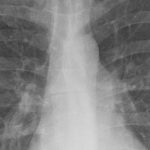Simon eased the door open to avoid the whine of the old hinges and tiptoed inside. Thirty-four and still sneaking about like a damned child. He straightened up, pressed his foot down.
The room was clean, courtesy of their neighbour, Agata. There was a desk at the far end of the room, an armchair behind it, then a bay window. Between them, mismatched chairs. One wall was a world map wearing two short pieces of string.
The old man was turned around in his slouching armchair, facing the window. Only a few limp strands of his hair remained, drooping across a ragged ruby gash. Simon ran his fingers through his own hair and checked for strays. He couldn’t tell in the dark.
The snow fell wet and heavy from the early December sky. It was piling onto the branches of the spruce trees just outside the window. They’d once had snowball fights in weather like this. He’d always packed it as hard as he could, so it wouldn’t fall apart in the air. They took time to make. His dad grabbed the snow and compressed it in one motion, threw it in another. It would break apart in the air, end up in Simon’s hair, down his neck. By the time Simon finished a snowball that would reward with a satisfying smack against his dad’s jacket, he was already soaked by careless debris. They’d throw until their hands burned cold, then come in for tea.
His father would make him a cup every time. Simon rarely drank it. He would wrap his hands around the mug, hook his thumbs through the handle, and let the heat soak into him. Sometimes he would drag the teabag around the cup, watch the darkening gyre.
“Stop that,” his father would say, “You have to let it settle in,” and Simon would dry his finger on his jeans.
“This is Darjeeling,” his father might say, depending. “From India. They call it the champagne of teas. It’s from the east. They say it’s so hot during the day that you can’t move, but later a sweet midnight breeze comes in off the water and gives you more energy than you’ve ever had in your life.”
Then, his father would take his first long, slow sip—always with his eyes closed.
Simon couldn’t feel the heat of the east in there now, though.
He pulled one of the mismatched chairs up near the old man. The light coming off the building snow outside made him look almost translucent. When they were younger, his father’d had skin like leather. He’d smelled like sawdust and aftershave. Now, he breathed shallow breaths that didn’t disturb the thin line of steam rising from the tea that rested in his lap. It would be Earl Grey—his preference for first snowfalls. There was another cup on the desk, askew with the unevenness of a knot in the wood, threatening to spill. Simon dipped a finger in and sailed the bag around. He dried his finger on his jeans.
“I see you still haven’t fixed the desk.”
“You still haven’t realized there’s nothing to fix.”
“This corner . . . My tea is crooked.”
“Then use a different desk.”
Simon rubbed his hand across his stomach where it was starting to push over his belt.
“I didn’t mean it, what I said earlier. I just . . . Come. Come stay with me.”
“Why?”
“Why not? You hate it here. Always have. I don’t know why we didn’t move, after mom.”
“You don’t move a boy in school.”
“And then? You used to want to travel. We can, you know, now.”
“Too old now. Besides . . .” He sipped his tea.
His father never talked about his mother unless Simon forced it, and then it was all one-word answers and then silence. Simon could barely remember her except that she smelled like flowers. ‘Perfume’s expensive, and flowers are all around if someone would just make the effort.’ she always said. He remembered that.
But the only image of her in his head was her silhouette in his bedroom doorway. He knew what she looked like; his dad had about a dozen photographs of her that he rotated through the house. Every time Simon came around, they’d moved. They seemed alive that way. But he didn’t remember her.
“Well, you have to come,” he said. “You have to. I can’t keep taking time off like this.”
“Then don’t.”
“And what if something happens?”
“What’s going to happen?”
“Well, Agata has her own life. And they’re phasing out homecare. It’s not like it used to be. And . . . neither are you.”
The old man placed his cup on the desk, crossed his arms, and closed his eyes.
Simon slapped his thighs. “Great.”
He leaned back and looked past his father out the window. He sat until his tea stopped steaming, until the smaller of the two spruces bounced its drooping shoulders in the wind and shrugged the snow off, a crystalline trail drifting after.
Simon left the door open—just a touch.
In the kitchen, he found a grinder, cafetiere, and dark roast waiting. Agata must have bought the coffee. His father didn’t keep it. What would they do without her? He put the kettle on. When the kettle cried he poured it slowly into the press. He watched the grounds dance a full three minutes and breathed it in before fitting the plunger into the body and resting his hand on it, letting gravity bring it down.
In the lounge, he dragged a chair to the window, curled his legs underneath him, and linked his thumbs through the handle of his cup. He messaged work about missing a few more days. He twisted his back and his neck to look down at those trees. He could see them, but the angle was different, and he was losing the light. They seemed to blend together, limbs entangled.
…
Biography
Adrian Markle is a PhD student at the University of Exeter. He lives in Cornwall, where he works as a teacher and freelance editor. He was published most recently in Cornish Short Stories and has work upcoming in Aethlon, The Journal of Sport Literature.
Image: Pexels.com





